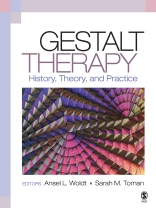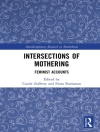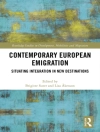Praise for Gestalt Therapy: History, Theory, and Practice
‘This is an incredibly important addition to the world of psychotherapy and Gestalt, in particular. This book will be very helpful for use with various courses of study, not just Gestalt institutes and special training programs, but also general graduate school classes in masters programs for mental health, social work, counseling, allied health professionals, psychiatry, and psychology. I highly recommend this book. I think it will make an excellent contribution.’
-Norman Shub, Gestalt Associates, Columbus, Ohio & Gestalt Institute of Central Ohio
‘Ansel L. Woldt and Sarah M. Toman have put together a monumental text that fills a gap in the genre of serious Gestalt literature that has remained relatively empty since Perls, Hefferline, and Goodman′s Gestalt Therapy was published in 1951. This is not to say that there haven′t been extraordinary works in this field published since then; however, this is one of the most expansive books of the recent collection. Each of the chapter authors has written impressive selections that, taken one-by-one, are valuable additions for serious students and practitioners. What earns this book an evaluation as extraordinary is both the content and the structure.’
-J. Edward Lynch, Southern Connecticut State University
Gestalt Therapy: History, Theory, and Practice is an introductory text, written by major Gestalt theorists, that will engage those new to Gestalt therapy. Editors Ansel Woldt and Sarah M. Toman introduce the historical underpinnings and fundamental concepts of Gestalt therapy and illustrate applications of those concepts to therapeutic practice. The book is unique in that it is the first Gestalt text specifically designed for the academic and training institute settings. Gestalt Therapy takes both a conceptual and a practical approach to examining classic and cutting-edge constructs. In each chapter, understanding of concepts proceeds from content to case applications to experiential exercises.
is an introductory text, written by major Gestalt theorists, that will engage those new to Gestalt therapy. Editors Ansel Woldt and Sarah M. Toman introduce the historical underpinnings and fundamental concepts of Gestalt therapy and illustrate applications of those concepts to therapeutic practice. The book is unique in that it is the first Gestalt text specifically designed for the academic and training institute settings. takes both a conceptual and a practical approach to examining classic and cutting-edge constructs. In each chapter, understanding of concepts proceeds from content to case applications to experiential exercises.Key Features
- Organized into two parts to provide the background, theory, and methodology first in Part I before examining the applications of Gestalt therapy in Part II
- Chapters are written by theorists and practitioners who are experts in various aspects of Gestalt therapy
- Chapters follow a consistent format-Introduction (with bios of chapter authors and dialogue respondents), Body/Content (with case study examples), Conclusion, Review Questions, and Experiential Applications and Activities
- ‘Dialogue Boxes’ run alongside the content, thus mirroring a key Gestalt concept of valuing multiple perspectives and voices
- An Epilogue guides readers to training resources, Gestalt Internet resources, and Gestalt organizations
Gestalt Therapy is designed for graduate students studying mental health, as well as for trainees at the many Gestalt training institutes around the world.
is designed for graduate students studying mental health, as well as for trainees at the many Gestalt training institutes around the world.Daftar Isi
ACKNOWLEDGEMENTS
PROLOGUE – FOREWORD
PRE-TEXT: GESTALT PEDAGOGY:
CREATING THE FIELD FOR TEACHING AND LEARNING – Ansel L. Woldt, Ed.D.
Dialogue Respondent – Sarah M. Toman, Ph.D.
PART I: FOUNDATIONS OF GESTALT THERAPY
Chapter 1. The History and Development of Gestalt Therapy – Charles E. Bowman, M.S.
Dialogue Respondent – Edwin C. Nevis, Ph.D.
Chapter 2. Classical Gestalt Therapy Theory – Margherita Spagnuolo Lobb, Psy.D.
Dialogue Respondent – Philip Lichtenberg, Ph.D.
Chapter 3. Contemporary Gestalt Therapy: Field – Malcolm Parlett, Ph.D.
Dialogue Respondent – Robert G. Lee, Ph.D.
Chapter 4. Phenomenology, Existentialism and Eastern Thought in Gestalt Therapy – Sylvia Fleming Crocker, Ph.D.
Dialogue Respondent – Peter Philippson, M.Sc.
Chapter 5. Gestalt Therapy Theory of Change – Gary Yontef, Ph.D., M.S.W., A.B.P.P.
Dialogue Respondent – Reinhard Fúhr, Ph.D.
Chapter 6. Gestalt Therapy Methodology – Joseph Melnick, Ph.D. & Sonia March Nevis, Ph.D.
Dialogue Respondent – Norman Shub, B.C.D.
Chapter 7. Cultural Influences and Considerations in Gestalt Therapy – Sabin Fernbacher, M.A.
Dialogue Respondent – Deborah Plummer, Ph.D.
Chapter 8. Spirituality in Gestalt Therapy – R. Elliott Ingersoll, Ph.D.
Dialogue Respondent – Brian O′Neill, M.A., Ps.S.
PART II: GESTALT APPLICATIONS WITH SPECIFIC POPULATIONS
Chapter 9. Gestalt Therapy with Children – Cynthia Reynolds, Ph.D.
Dialogue Respondent: – Peter Mortola, Ph.D.
Chapter 10. Adolescents: Development and Practice from a Gestalt Orientation – Sarah Toman, Ph.D., and Ann Bauer, Ph.D.
Dialogue Respondents – Mark Mc Conville, Ph.D., & Bruce Robertson, M.S.W.
Chapter 11. Family and Couple Therapy from a Gestalt Perspective – J. Edward Lynch, Ph.D., and Barbara Lynch, Ph.D.
Dialogue Respondent – Joseph C. Zinker, Ph.D.
Chapter 12. Gestalt Therapy in Groups – Paul Schoenberg, Ph.D., and Bud Feder, Ph.D.
Dialogue Respondents – Jon Frew, Ph.D., & Irwin Gadol, Ph.D.
Chapter 13. Gestalt Approaches with Organizations and Large Systems – Rick Maurer, Ph.D.
Dialogue Respondent – Seán Gaffney, Ph.D.
Chapter 14. Gestalt Therapy in Community Mental Health – Philip Brownell, M.Div., Psy.D.
Dialogue Respondent – Karen Fleming, Ph.D.
Chapter 15. Gestalt Approaches to Substance Use/Abuse/Dependency: Theory and Practice – Michael Clemmens, Ph.D., M.S.W.
Dialogue Respondent – Helga Matzko, M.A., M.A., C.A.G.S.
Chapter 16. Gestalt Educational Therapy – Cara Garcia, Ph.D., Susan Baker, M.A., & Robert de Mayo, Ph.D.
Dialogue Respondent – George I. Brown, Ph.D.
EPILOGUE – AFTERWORD
COMPREHENSIVE REFERENCE AND GESTALT BOOK LIST
APPENDIX
Tentang Penulis
Sarah M. Toman (Ph.D., Counseling Psychology, Kent State University, 1995) is a graduate of the three-year post-doctoral Gestalt Training Program at the Gestalt Institute of Cleveland. She serves as Secretary for the Association for the Advancement of Gestalt Therapy. She has been teaching an advanced graduate Gestalt Therapy course at Cleveland State University, where she is an Associate Professor of Counseling, Administration, Supervision and Adult Learning. Dr. Toman serves as Research Chair for the National Career Development Association, has published articles and book chapters, and has offered over 30 presentations at State, National, and International conferences. With Kathryn Mac Cluskie and Elizabeth Welfel, she is a co-author of the book, Using Test Data in Clinical Practice (Sage 2002).












